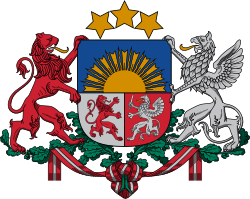| ||||||||||||||||||||||
Are you for the repealing of the law “Amendments to the National Security Law” of March 1, 2007? | ||||||||||||||||||||||
| Outcome | The proposal failed as voter turnout was below 453,730, half of the votes cast in the last Saeima elections. | |||||||||||||||||||||
|---|---|---|---|---|---|---|---|---|---|---|---|---|---|---|---|---|---|---|---|---|---|---|
| Results | ||||||||||||||||||||||
| ||||||||||||||||||||||
Are you for the repealing of the law “Amendments to the State Security Authorities Law” of March 1, 2007? | ||||||||||||||||||||||
| Outcome | The proposal failed as voter turnout was below 453,730, half of the votes cast in the last Saeima elections. | |||||||||||||||||||||
|---|---|---|---|---|---|---|---|---|---|---|---|---|---|---|---|---|---|---|---|---|---|---|
| Results | ||||||||||||||||||||||
| ||||||||||||||||||||||
 |
|---|
A referendum on two proposed security laws was held in Latvia on 7 July 2007; the referendum had been called after the president refused to sign the laws, claiming possible influence of oligarchs on Latvia's national security, and after 212,000 signatures had been collected, meeting the requirement of about 150,000 signatures. [1] Although the referendum failed to reach the quorum of 453,730 votes, the results showed massive disapproval of the amendments.